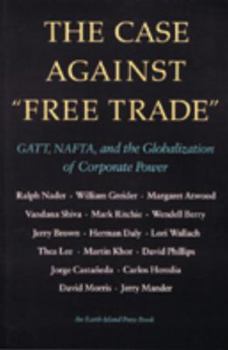The Case Against Free Trade: GATT, NAFTA and the Globalization of Corporate Power an Earth Island Press Book
Select Format
Select Condition 
Book Overview
This book examines the notion of free trade and the issues raised by adopting the General Agreement on Tariffs and Trade (GATT) and the North American Free Trade Agreement (NAFTA). Essays by Ralph... This description may be from another edition of this product.
Format:Paperback
Language:English
ISBN:1556431694
ISBN13:9781556431692
Release Date:September 1993
Publisher:North Atlantic Books
Length:230 Pages
Weight:0.64 lbs.
Dimensions:0.6" x 5.5" x 8.6"
Customer Reviews
2 ratings
Compelling, for unusual reasons
Published by Thriftbooks.com User , 20 years ago
The proponents of free trade have had at their disposal a convincing and, often times, quite believable theory to describe the way that the world functions. As a liberal, I have frequently wanted to reject all the theoretical underpinnings of free trade. I've spent many hours trying to fill their theory with holes. At the same time, as an economics major and free thinker, it's just not been tenable for me to disregard modern economic theory. There are no alternatives that could take the theory's place in effectiveness, or in accuracy. In sum, I picked up this book at a time when what I wanted to believe did not gel with what I was compelled to believe, academically. This book does not explicitly offer a "third way" that could substitute for capitalism or socialism. And as might be expected, the authors make a big deal out of the bad things that come with economic liberalism. The "Race to The Bottom" is mentioned quite often. In this sense, there's not much new here. Read Soros, Stiglitz, Greider, or even Wallerstien - you'll find a lot of the same thing. What is unique about this book, and why I am giving it five stars, is that the book added a new dimension to the context of my discontent with the current "system." More exactly: the alternative theory that could come out of this book pales to liberalism; much of the liberal thought about economics has to do with values, and it not often as compelling as the official theory; and while this book emphasizes values to a great deal (state sovereignty, for example) it tends to emphasize values that are much more axiomatic. For example: The authors describe how the specifics of NAFTA were not made readily and directly available to the public; and even once they were, the document was so convoluted and inaccessible that hardly anyone bothered to read it. This example (there are many others) is useful to me because it does not necessitate e a conflict with liberalism. In other words: It may be true that free trade works best. I don't want to believe that, I am compelled nevertheless to believe that, but no matter what I believe about free trade, I am positive that trade agreements should be made available to the public (quickly, cheaply, and in a language that can be understood). Values are still involved. But the answers to the "value questions" are answered axiomatically, for most of us. This book is unique and valuable (no pun) for the reason that it criticizes free trade in a way that (1) the criticism will either be accepted or rejected immediately, and (2) the criticism is not contradictory, and may be useful, to the liberalist's theory that has been so difficult to dethrone.
It'll Change your Mind
Published by Thriftbooks.com User , 24 years ago
This is an excellent book written by some of the leading authorities on NAFTA and GATT (Including Ralph Nader). Each "chapter" written by a different person is short and to the point. You can read as much or as little as you want, without feeling the need to finish the chapter. This book WILL make you sweat with anger at points. It is an excellent read.





